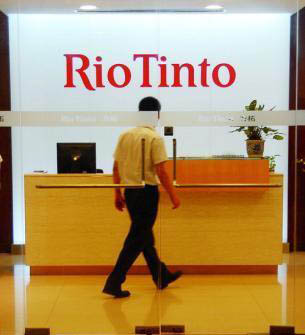Thanks to sales of iron ore in the Chinese markets, and a proposed ‘marriage’ with Aluminum Corp. of China (Chinalco), Rio Tinto has scuttled off with 400 billion RMB in profits made in China. However, the breaking off of the deal with Chinalco and the espionage investigations into the actions of their Chinese employees has caused a blow to Rio Tinto’s public image, and losses approaching 100s of billions. Shareholders in the capitalist world are clearly voting with their feet; since July, Rio Tinto share prices are down 30% as shareholders flee the sinking ship.

Photo: youth.cn
Rio Tinto Sneakily Reaps Profits in China
Rio Tinto, the Australian mining giant, has reaped more than 60 billion in profits in the last year, selling iron ore in China. They also masterminded an ingenious plan – use Chinalco’s investment attempts to successfully fund a turnaround of its own financial crisis – that helped them realize an increase in assets of more than 302.1 billion RMB. A further round of Chinalco investment, this time a cash inflow of 10.2 billion RMB, enabled their profits in Chinese markets to reach 400 billion RMB. However, Rio Tinto wasn’t satisfied the gains they’d made in the Chinese market, not only did they unilaterally break off the deal with Chinalco, but they employed espionage as an attempt to further undermine Chinese steelmaking industries in their negotiation efforts in the iron ore markets.
Rio Tinto Suffers Billions in Losses; Devastating Blow to Integrity
Rio Tinto’s single-handed trashing of the deal with their Chinese ‘partners’ Chinalco, gave early proof of the sneakiness evident in the Australian mining titan’s business deals – particularly its deals in China; but the espionage attempts really pushed Rio Tinto’s true nature to the forefront.
At the outbreak of the espionage investigation, and the subsequent arrest of four employees at Rio Tinto’s Shanghai headquarters, Australian Senator Barnaby Joyce was immediately quoted in the Wall Street Journal as saying the espionage charges were related to failed investment attempts by Chinalco in Rio Tinto shares – a tactic to persuade the public that the charges are, in fact, China’s way of avenging Chinalco’s failed investment plans.
“Even with the failed investment into Rio Tinto by Chinalco, it is still a fact that Chinalco is one of the company's largest single shareholders. To say that the arrest of Rio Tinto employees in its Shanghai headquarters is connected with Chinalco is very irresponsible of a supposed business partner – as this kind of speculation can easily fuel a drop in the Chinalco's stocks and further dampen the company's already unpopular choice to invest in Rio Tinto in the first place,” an investor in the China steelmaking industries was quoted as saying.
Shareholders are Voting with Their Feet
Thus, with the trashing of the deal with Chinalco and the ongoing espionage investigations, Rio Tinto is facing a huge blow to their public image and business integrity overall, and is not favored by investors to fare well in the Chinese markets. This is demonstrated in the further drop in share prices of both Rio Tinto Australian and British stocks – with stocks in both markets falling more than 30%, totaling a loss in the 100s of billions.
Read the original in Chinese here
***
Related Links
Survey: How Chinese Respond to Rio Tinto's Alleged Espionage
China arrests Rio Tinto employees on spy charge
Rio Tinto-Chinalco: China Is Not Amused
Warning:The use of any news and articles published on eChinacities.com without written permission from eChinacities.com constitutes copyright infringement, and legal action can be taken.
All comments are subject to moderation by eChinacities.com staff. Because we wish to encourage healthy and productive dialogue we ask that all comments remain polite, free of profanity or name calling, and relevant to the original post and subsequent discussion. Comments will not be deleted because of the viewpoints they express, only if the mode of expression itself is inappropriate.
Please login to add a comment. Click here to login immediately.